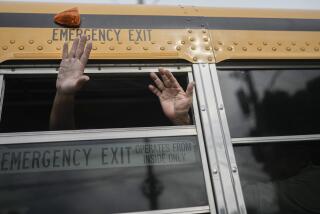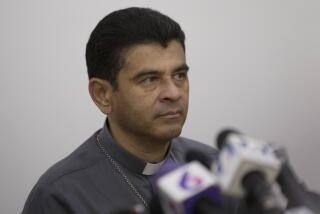20 Nicaraguan Hostages Freed; Journalists Held
- Share via
MANAGUA, Nicaragua — Armed rebels in the northern Nicaragua hills late Sunday released 20 of the 38 hostages they captured four days ago, but a second band of gunmen holding the country’s vice president here in the capital seized nine journalists as the crisis continued.
The former Contra rebels in the north promised to free the rest of their hostages in exchange for a guarantee that the army would not attack, said a spokesman for the Organization of American States, which is mediating. Negotiators expressed hope that the pro-Sandinista hostage-takers in Managua would follow suit.
The hostage crisis has deepened the abyss in which the government of President Violeta Barrios de Chamorro finds itself. Paralyzed by political bickering and the lingering hatreds of more than a decade of war and insurrection, the government and the nation seem mired in chaos.
“The country cannot take it anymore,” La Prensa, the newspaper owned by Chamorro’s family, said in a front-page editorial. “Kidnaping spawns kidnaping, one crime provokes another crime. . . . The saying that violence spawns violence has been proven once again.”
Pro-Sandinista gunmen in Managua who had released 14 of their 34 prisoners late Saturday turned the tables Sunday by capturing nine Nicaraguan journalists covering the story.
Their other hostages, including Vice President Virgilio Godoy, were moved to rooms without electricity or water inside the headquarters of the conservative National Opposition Union, or UNO, which the gunmen first stormed Friday night.
“The picnic is over,” said the lead hostage-taker, identified in press reports as Donald Mendoza, a former major in the Sandinista People’s Army.
Apparently fearing a police attack, the gunmen opened fire Sunday afternoon, sending reporters and police scurrying. Presidential spokesman Danilo Lacayo had been trying to hold an impromptu news conference a short distance from the UNO headquarters when gunfire rang out, forcing him to duck and dive for cover.
Clearly becoming nervous and agitated, the gunmen also forced their captives, including former National Assembly President Alfredo Cesar and other conservative legislators, to stand in front of the building’s windows in their underwear and stocking feet.
Earlier, a dispirited Godoy--who himself broke with Chamorro and is one of her most outspoken critics--seemed to be losing hope in the government’s ability to handle the crisis. “The press, the police, the public and the government will all grow bored with this,” Godoy said, “and we’ll spend the rest of our days here.”
The hostage crisis began Thursday when the rearmed former Contras operating near the remote northern town of Quilali seized a delegation of legislators and others carrying an offer of amnesty for rebel attacks prior to Aug. 15. The rebels demanded the removal of armed forces chief Gen. Humberto Ortega, a powerful Sandinista, and Chamorro’s principal aide, Antonio Lacayo.
It was not clear if those demands were still on the table as the rebels late Sunday started to release their captives after meeting with negotiators including representatives of the government, the conservative political opposition and the church.
Earlier, the Contras had rejected mediation efforts, saying they would negotiate only with Cardinal Miguel Obando y Bravo, who is frequently called on to mediate this nation’s crises.
The United States spent millions of dollars through the 1980s to finance the Contra rebels’ fight against the leftist Sandinista government. The bitter Cold War struggle claimed an estimated 30,000 Nicaraguan lives.
With the upset victory of Chamorro and her conservative political coalition over former Sandinista President Daniel Ortega in 1990 elections, the war ended and hopes for reconciliation began.
But the continued influence of the Sandinista Front in the government--Sandinistas remain in control of the army and police--angered conservatives and drove Chamorro’s allies to abandon her.
Most recently, the U.S. Senate voted to suspend $98 million in aid after the explosion of a secret arms dump belonging to Salvadoran guerrillas raised questions about the Sandinistas’ ties with international terrorists--and Chamorro’s ability to control the Sandinistas.
“War, anarchy and blood are at the doorstep of our house,” a pro-leftist group of religious workers said Sunday in a statement.
The political chaos has crippled Nicaragua’s efforts to recover economically from a decade-long war.
“You cannot think in terms of development when you have hundreds of armed men roaming the countryside, assaulting, robbing, killing,” Luis Carrion, a leading Sandinista, said in a recent interview. “You cannot think of economic development when you have very large social conflicts all around the country.”
More to Read
Sign up for Essential California
The most important California stories and recommendations in your inbox every morning.
You may occasionally receive promotional content from the Los Angeles Times.













